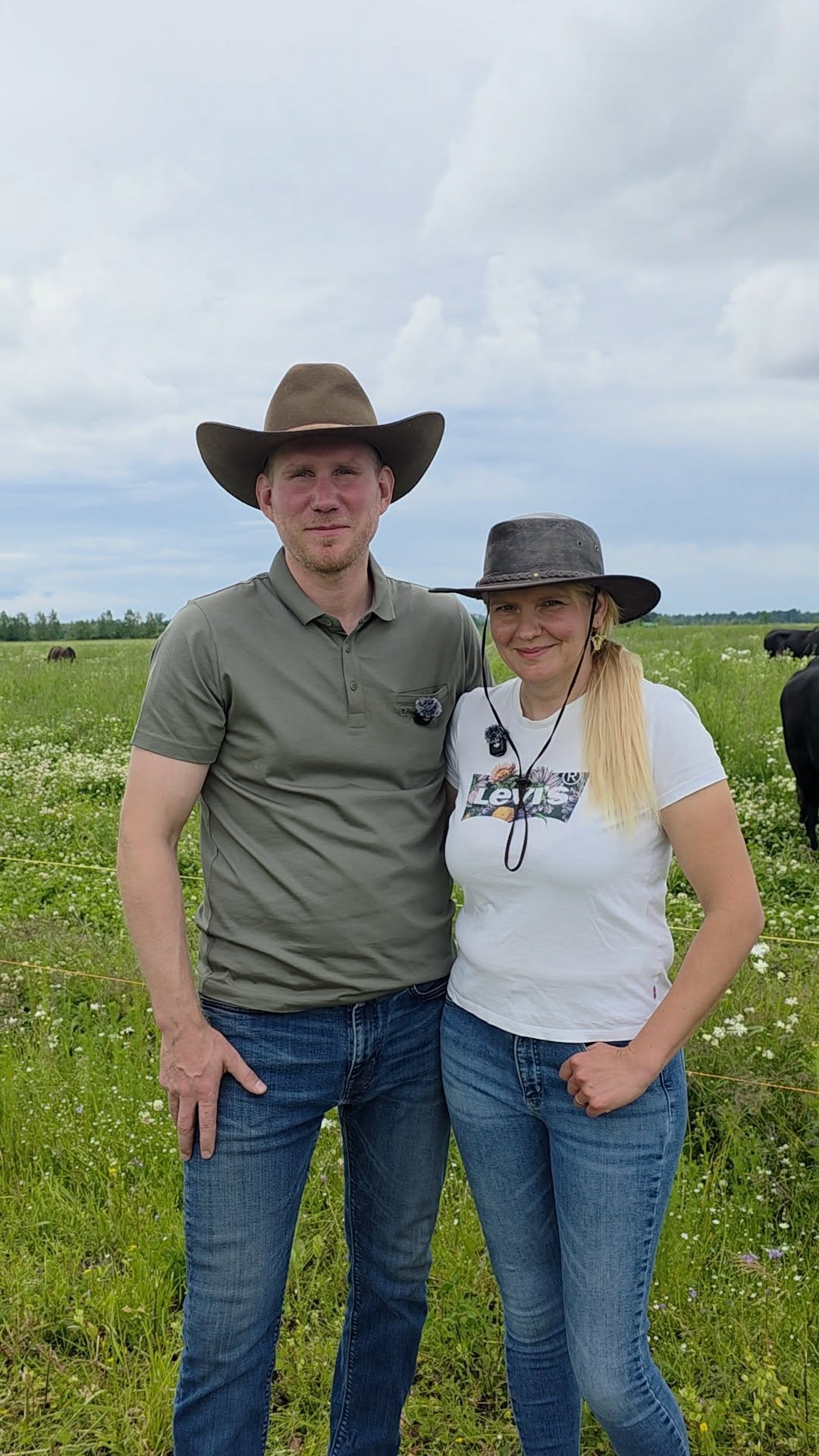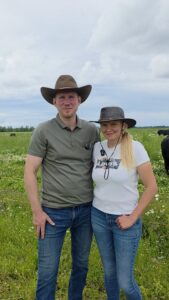
Candidates for Farmer of the Year 2025: Marko and Lisanna Hiiemäe – a family that fosters trust, cattle, and community.

Where nature and human will meet, something extraordinary happens. Such is the world of the Hiiemäe family – beef farmers whose passion for animals, sustainable agriculture, and community has created much more than just a farm.
Lisanna Hiiemäe recalls that although as a child she saw cows in the pasture and chickens at her grandmother’s house, she didn’t have direct experience with farm work. “I grew up in a small town near the city, and I attended kindergarten and school in the city. Back then, I was more drawn to the bright lights and fast pace of the city. After high school, I moved to Tallinn and started university. I also lived in America and London for a while. After the birth of our first child, Marko and I realized that something needed to change, and so we moved to the countryside. Today, our rural life and farm work have become a lifestyle, and the city lights are gone. I enjoy every moment I can spend with family, animals, and nature,” she shared about her life changes.
Marko Hiiemäe says that animals came into his life in a circle. “My childhood was spent on a farm where we kept dairy cows, sheep, pigs, and chickens. When EU regulations ended my father’s farm operations, moving to the city felt natural,” he recalls. But while walking on the cobblestones of Tallinn’s Old Town with his first daughter, Marko felt that the freedom of childhood, running barefoot in the fields, and interacting with animals could also be part of his children’s future. So they decided to purchase Marko’s father’s property, along with 20 hectares of land. “Initially, we didn’t plan to keep beef cattle for business purposes,” they remember. “We simply wanted the land to be maintained, and if someone could grow something there and it would eventually pay off, why not.”
The power of knowledge
On a friend’s recommendation, the family chose beef cattle because they are good land caretakers. Marko immediately contacted Järvamaa Vocational Education Centre and started training to become a beef cattle specialist. A few years later, Lisanna followed the same educational path. “We also communicated with other breeders, watched YouTube videos, attended courses, and enriched our knowledge in every way possible,” they recalled their early days. The first 13 Limousin breed beef cattle arrived from Germany in 2016. As their herd grew organically, so did their awareness. At one point, they had 80 cattle and over 150 hectares of land. Then they decided to make a real change: to stay as farmers, invest, and grow their own feed to create something greater.
Today, the family manages nearly 400 hectares of land, primarily raising purebred Japanese Wagyu cattle—the largest herd in Estonia. “It’s not just a matter of quantity. We realized that we don’t want to raise just meat, but focus on quality,” explains Marko. “When we eat, we want to eat well. Wagyu beef is authentic, marbled, flavorful, and well-suited for our land and climate.”
Growing good meat requires knowledge and consistency. When asked what is needed to become a successful livestock farmer, Marko simply responds: “Three things – a good owner who knows what they’re doing; a strong genetic base for the animals; and quality feed. When these are in place, the results will follow.” He also adds that technology and the world are changing rapidly, and relying on old knowledge is not enough. “Those who don’t learn today will fall behind.”
The Sepa farm family competes every spring in a breed bull contest and has received awards for their excellent beef bulls. When asked what qualities or skills are most useful in raising beef cattle, they say patience and calmness are key. “You can’t approach the animal nervously. It can sense that. In nature, not all years are friendly, and you can’t control everything. You need to maintain a calm mind,” says Marko. Lisanna adds that livestock farming teaches resilience to crises and stress. “You need to look for solutions, not worry about things you can’t change. A positive attitude, a clear goal, and bold initiative will lead to success.”
Pure food and biodiversity
Marko Hiiemäe also talks about organic farming with moderate balance. The Sepa farm has an organic certification, but for the family, what’s more important is how the animals actually live. Rotational grazing, maintaining pastures, and supporting biodiversity have been their practices even before certification. “We’ve been doing this from the very beginning, just without official papers. People want clean, local food – that should be valued,” emphasizes Marko. His food philosophy is based on honesty: “Pure food is born from honesty. It doesn’t matter whether it’s organic or not; if the animal is well-raised and the consumer trusts you, all is well.” He also worries that local small-scale producers are under pressure. “If this disappears, so will a livable rural life. Then only industry remains.”
The Hiiemäed are convinced that locals primarily value local food. “More attention should be paid to this – why do we have so little, and why is production concentrated in large companies,” they ask. They emphasize that it’s not just about food but about the living environment. “If that disappears, the charm of rural living and the riches of this land will vanish. That’s why more focus should be on this now, rather than only on organic farming.”
Regenerative agriculture is not just a slogan for them but a lifestyle. “We don’t do everything perfectly according to the book, but we see how nature responds. The pasture comes alive, and that’s no coincidence.” Marko draws inspiration from both travels and his homeland. He especially highlights Airi Külvet, whom he calls the mother of regenerative agriculture in Estonia. “We learned this spark from her and how to do things. Every farm is different, and everyone finds the principles that work for them.”
The results of their work are visible in the pastures, where life has started to pulse again. “I also mow fields myself – permanent pastures, for hay. The plant diversity we have is thanks to our daily practices. The animals are on the pastures, and this has helped nature come alive again, especially in areas where monocultures were previously cultivated intensively,” pointed out Marko.
Community leaders
The Hiiemäed have shown that real change happens both in the field and within the community. They see it as important to be visible and heard. The farm has participated in Open Farms Days, organized local café days, and hosted school groups, top chefs, and guests from around the world. The Beef Festival, which is prepared throughout the year, is one of their most visible initiatives. “Every meeting with a guest has potential,” says Marko. “When someone sees how animals are kept, they get a new perspective, and this helps build our brand.” This year, they opened a small café near their home, offering organic pasture-raised beef burgers and other delicacies.
Participation in community life is not just PR for the Hiiemäed but a natural part of life. “If you want the sector to grow, you need to make yourself visible. If we don’t speak up, nobody else will do it for us,” they emphasize. In their view, this is the best way to make beef cattle farming more attractive, appealing, and inspiring for young people, consumers, and decision-makers.
The story of Sepa farm proves that a visionary family can produce more than just a herd—they build trust, a connection between land and people, and faith that agriculture is not just yesterday’s thing but the foundation of the future. “Not everything is always under our control,” admits Marko. “But we can do our part as best as we can.”
Video: https://www.facebook.com/share/r/1YjYLsYuga/?mibextid=wwXIfr
The article was written by Juuli Nemvalts, 17.07.2025
